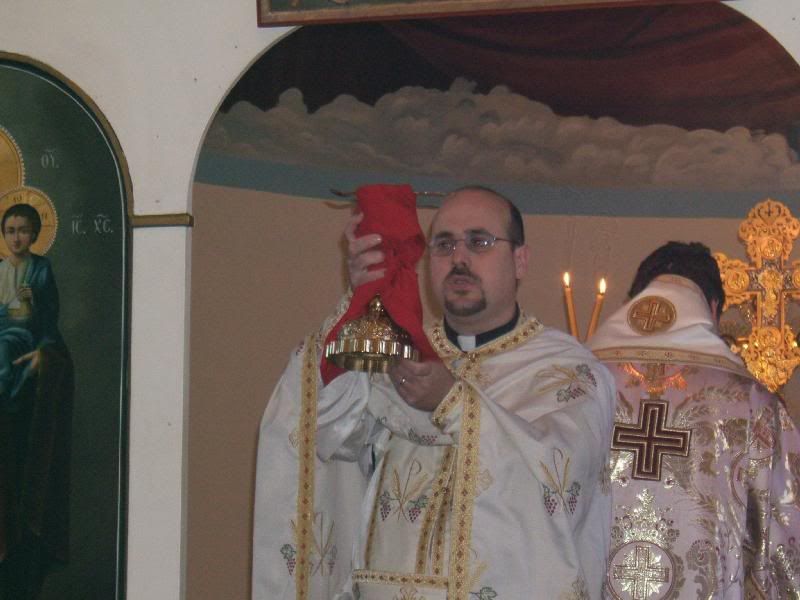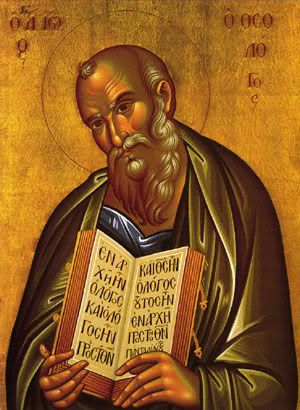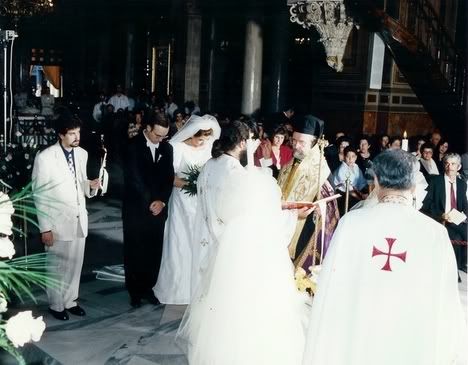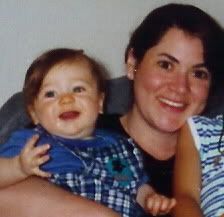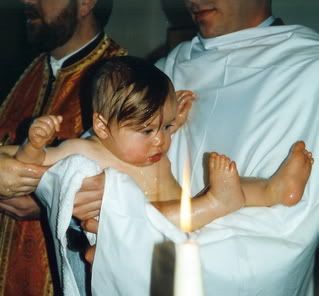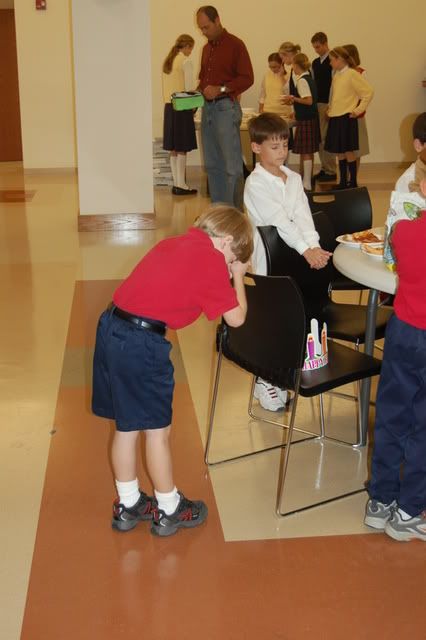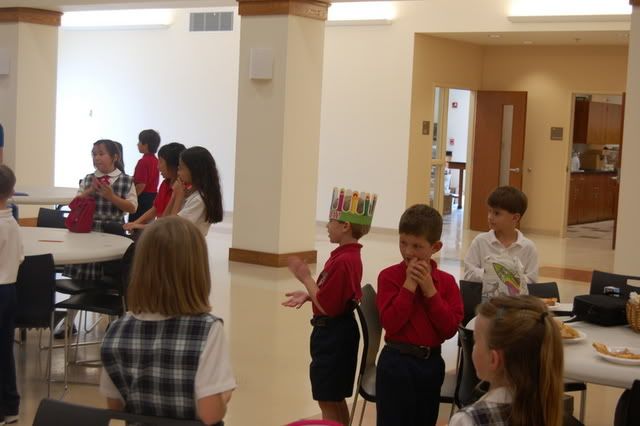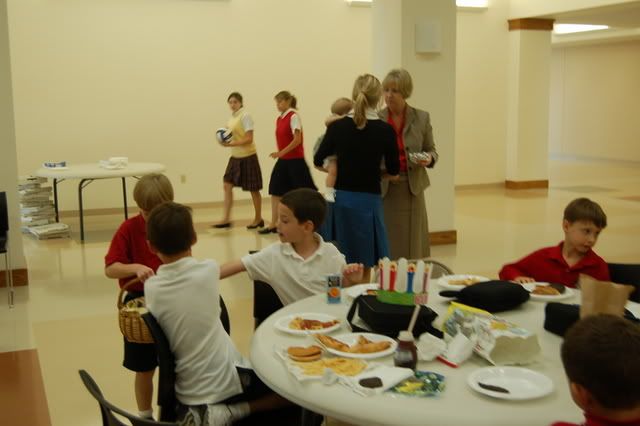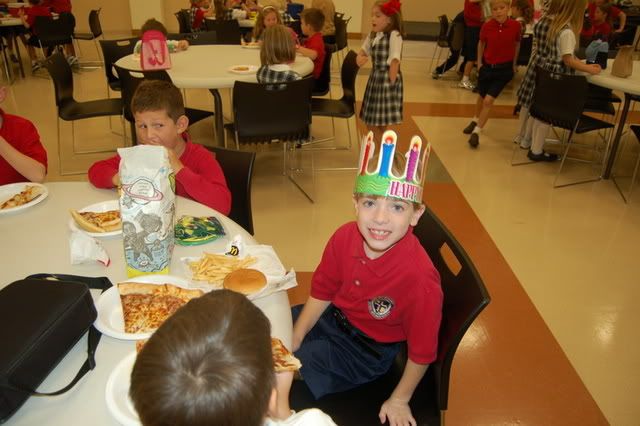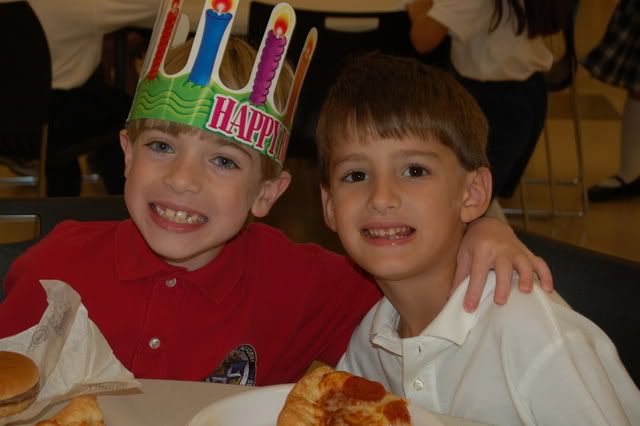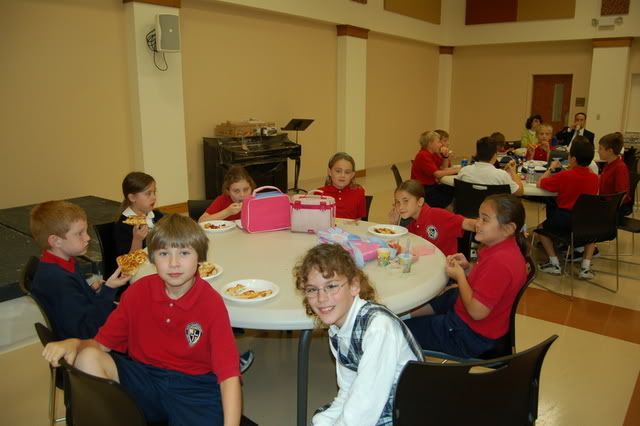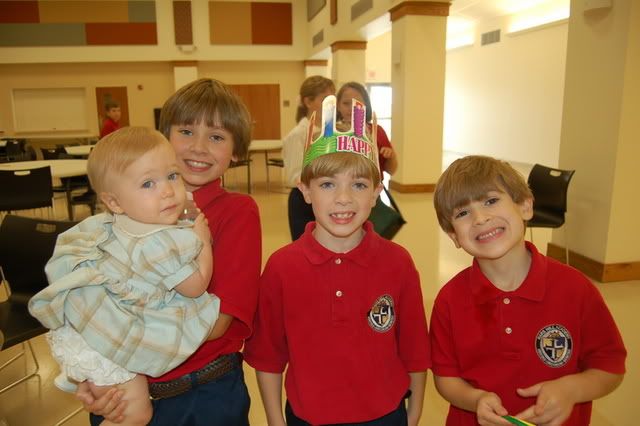St. Kyriakos the Hermit of Palestine Saint Kyriakos was born in Corinth in 448 to the priest John and his wife Eudokia. Bishop Peter of Corinth, who was a relative, seeing that Kyriakos was growing up as a quiet and sensible child, made him a reader in church. Constant reading of the Holy Scriptures awakened in him a love for the Lord and of a yearning for a pure and saintly life. |
Month: September 2006
-
Today 10 years ago on Sunday, September 29th, in Pireaus Greece, Fr. was ordained to the Holy Priesthood.Happy 10th Anniversary!Axios!O God, great in might and inscrutable in wisdom, marvelous in counsel above the sons of men: You the same Lord, fill with the gift of Your Holy Spirit this man whom it has pleased You to advance to the degree of Priest; that he may become worthy to stand in innocence before Your altar, to proclaim the Gospel of Your kingdom, to minister the word of Your truth, to offer to You spiritual gifts and sacrifices; to renew Your people through the font of regeneration, that when he shall go to meet You, at the second coming of our great God and Savior, Jesus Christ, Your only-begotten Son, he may receive the reward of good stewardship in the order given to him, through the plenitude of Your goodness.
-
Today, September 26th, is the feast day of St. John the Theologian and the anniversary of Fr’s ordination. It was on this day 10 years ago that Fr. was ordained a deacon.
Happy 10th Anniversary!
Axios!
The Holy Sacrament of Ordination to the Diaconate
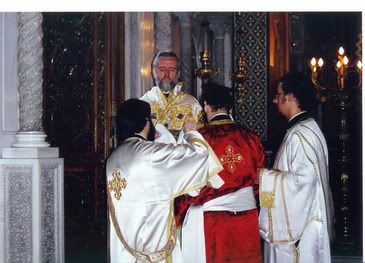
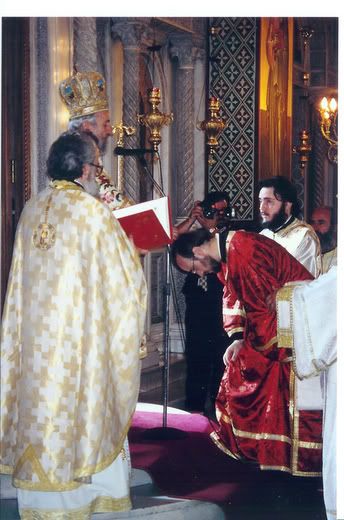
September 26, 1996, Metropolitan John (Zizioulas) of Pergamon ,
The Cathedral of the Holy Trinity Piraeus, Greece
The Holy Apostle and Evangelist John the
The Holy, Glorious All-laudable Apostle and Evangelist, Virgin, and Beloved Friend of Christ, John the Theologian was the son of Zebedee and Salome, a daughter of St. Joseph the Betrothed. He was called by our Lord Jesus Christ to be one of His Apostles at the same time as his elder brother James. This took place at Lake Gennesareth (i.e. the Sea of Galilee). Leaving behind their father, both brothers followed the Lord.
Theologian
The Apostle John was especially loved by the Savior for his sacrificial love and his virginal purity. After his calling, the Apostle John did not part from the Lord, and he was one of the three apostles who were particularly close to Him. St. John the Theologian was present when the Lord restored the daughter of Jairus to life, and he was a witness to the Transfiguration of the Lord on Mount Tabor.
During the Last Supper, he reclined next to the Lord, and laid his head upon His breast. He also asked the name of the Savior’s betrayer. The Apostle John followed after the Lord when they led Him bound from the Garden of Gethsemane to the court of the iniquitous High Priests Annas and Caiphas. He was there in the courtyard of the High Priest during the interrogations of his Teacher and he resolutely followed after him on the way to Golgotha, grieving with all his heart.
At the foot of the Cross he stood with the Mother of God and heard the words of the Crucified Lord addressed to Her from the Cross: “Woman, behold Thy son.” Then the Lord said to him, “Behold thy Mother” (Jn 19:26-27). From that moment the Apostle John, like a loving son, concerned himself over the Most Holy Virgin Mary, and he served Her until Her Dormition.
After the Dormition of the Mother of God the Apostle John went to Ephesus and other cities of Asia Minor to preach the Gospel, taking with him his own disciple Prochorus. They boarded a ship, which floundered during a terrible tempest. All the travellers were cast up upon dry ground, and only the Apostle John remained in the depths of the sea. Prochorus wept bitterly, bereft of his spiritual father and guide, and he went on towards Ephesus alone.
On the fourteenth day of his journey he stood at the shore of the sea and saw that the waves had cast a man ashore. Going up to him, he recognized the Apostle John, whom the Lord had preserved alive for fourteen days in the sea. Teacher and disciple went to Ephesus, where the Apostle John preached incessantly to the pagans about Christ. His preaching was accompanied by such numerous and great miracles, that the number of believers increased with each day.
During this time there had begun a persecution of Christians under the emperor Nero (56-68). They took the Apostle John for trial at Rome. St. John was sentenced to death for his confession of faith in the Lord Jesus Christ, but the Lord preserved His chosen one. The apostle drank a cup of deadly poison, but he remained alive. Later, he emerged unharmed from a cauldron of boiling oil into which he had been thrown on orders from the torturer.
After this, they sent the Apostle John off to imprisonment to the island of Patmos, where he spent many years. Proceeding along on his way to the place of exile, St. John worked many miracles. On the island of Patmos, his preaching and miracles attracted to him all the inhabitants of the island, and he enlightened them with the light of the Gospel. He cast out many devils from the pagan temples, and he healed a great multitude of the sick.
Sorcerers with demonic powers showed great hostility to the preaching of the holy apostle. He especially frightened the chief sorcerer of them all, named Kinops, who boasted that they would destroy the apostle. But the great John, by the grace of God acting through him, destroyed all the demonic artifices to which Kinops resorted, and the haughty sorcerer perished in the depths of the sea.
The Apostle John withdrew with his disciple Prochorus to a desolate height, where he imposed upon himself a three-day fast. As St. John prayed the earth quaked and thunder rumbled. Prochorus fell to the ground in fright. The Apostle John lifted him up and told him to write down what he was about to say. “I am the Alpha and the Omega, the beginning and the end, saith the Lord, Who is and Who was and Who is to come, the Almighty” (Rev 1:8), proclaimed the Spirit of God through the Apostle John. Thus in about the year 67 the Book of Revelation was written, known also as the “Apocalypse,” of the holy Apostle John the Theologian. In this Book were predictions of the tribulations of the Church and of the end of the world.
After his prolonged exile, the Apostle John received his freedom and returned to Ephesus, where he continued with his activity, instructing Christians to guard against false teachers and their erroneous teachings. In the year 95, the Apostle John wrote his Gospel at Ephesus. He called for all Christians to love the Lord and one another, and by this to fulfill the commands of Christ. The Church calls St. John the “Apostle of Love”, since he constantly taught that without love man cannot come near to God.
In his three Epistles, St. John speaks of the significance of love for God and for neighbor. Already in his old age, he learned of a youth who had strayed from the true path to follow the leader of a band of robbers, so St. John went out into the wilderness to seek him. Seeing the holy Elder, the guilty one tried to hide himself, but the Apostle John ran after him and besought him to stop. He promised to take the sins of the youth upon himself, if only he would repent and not bring ruin upon his soul. Shaken by the intense love of the holy Elder, the youth actually did repent and turn his life around.
St. John when he was more than a hundred years old. he far outlived the other eyewitnesses of the Lord, and for a long time he remained the only remaining eyewitness of the earthly life of the Savior.
When it was time for the departure of the Apostle John, he went out beyond the city limits of Ephesus with the families of his disciples. He bade them prepare for him a cross-shaped grave, in which he lay, telling his disciples that they should cover him over with the soil. The disciples tearfully kissed their beloved teacher, but not wanting to be disobedient, they fulfilled his bidding. They covered the face of the saint with a cloth and filled in the grave. Learning of this, other disciples of St. John came to the place of his burial. When they opened the grave, they found it empty.
Each year from the grave of the holy Apostle John on May 8 came forth a fine dust, which believers gathered up and were healed of sicknesses by it. Therefore, the Church also celebrates the memory of the holy Apostle John the Theologian on May 8.
The Lord bestowed on His beloved disciple John and John’s brother James the name “Sons of Thunder” as an awesome messenger in its cleansing power of the heavenly fire. And precisely by this the Savior pointed out the flaming, fiery, sacrificial character of Christian love, the preacher of which was the Apostle John the Theologian. The eagle, symbol of the lofty heights of his theological thought, is the iconographic symbol of the Evangelist John the Theologian. The appellation “Theologian” is bestown by Holy Church only to St. John among the immediate disciples and Apostles of Christ, as being the seer of the mysterious Judgements of God. -
“Lord Jesus Christ, Son of God, have mercy on me, a sinner.”
In my previous post Kristyn asked me to post more about the “Jesus Prayer”. At the monastery, in England, they have a Jesus Prayer Service every evening.
Fr. Steven Peter Tsichlis
Prayer is the basis of our Christian life, the source of our experience of Jesus as the Risen Lord. Yet how few Christians know how to pray with any depth! For most of us, prayer means little more than standing in the pews for an hour or so on Sunday morning or perhaps reciting, in a mechanical fashion, prayers once learned by rote during childhood. Our prayer life – and thus our life as Christians – remains, for the most part, at this superficial level.
THE CHALLENGE OF ST. PAUL
But this approach to the life of prayer has nothing to do with the Christianity of St. Paul, who urges the Christians of first century Thessalonica to “pray without ceasing” (1 Thess. 5:1). And in his letter to Rome, the Apostle instructs the Christian community there to “be constant in prayer” (Rom. 12:12). He not only demands unceasing prayer of the Christians in his care, but practices it himself. “We constantly thank God for you” (1 Thess. 2:13) he writes in his letter to the Thessalonian community; and he comforts Timothy, his “true child in the faith” (1 Tim. 1:2) with the words: “Always I remember you in my prayers” (2 Tim. 1:3). In fact, whenever St. Paul speaks of prayer in his letters, two Greek words repeatedly appear: PANTOTE (pantote), which means always; and ADIALEPTOS (adialeptos), meaning without interruption or unceasingly. Prayer is then not merely a part of life which we can conveniently lay aside if something we deem more important comes up; prayer is all of life. Prayer is as essential to our life as breathing. This raises some important questions. How can we be expected to pray all the time? We are, after all, very busy people. Our work, our spouse, our children, our school – all place heavy demands upon our time. How can we fit more time for prayer into our already overcrowded lives? These questions and the many others like them which could be asked set up a false dichotomy in our lives as Christians. To pray does not mean to think about God in contrast to thinking about other things or to spend time with God in contrast to spending time with our family and friends. Rather, to pray means to think and live our entire life in the Presence of God. As Paul Evdokimov has remarked: “Our whole life, every act and gesture, even a smile must become a hymn or adoration, an offering, a prayer. We must become prayer-prayer incarnate.” This is what St. Paul means when he writes to the Corinthians that “whatever you do, do it for the glory of God” (1 Cor. 10:31).THE JESUS PRAYER
In order to enter more deeply into the life of prayer and to come to grips with St. Paul’s challenge to pray unceasingly, the Orthodox Tradition offers the Jesus Prayer, which is sometimes called the prayer of the heart. The Jesus Prayer is offered as a means of concentration, as a focal point for our inner life. Though there are both longer and shorter versions, the most frequently used form of the Jesus Prayer is: “Lord Jesus Christ, Son of God, have mercy on me, a sinner.” This prayer, in its simplicity and clarity, is rooted in the Scriptures and the new life granted by the Holy Spirit. It is first and foremost a prayer of the Spirit because of the fact that the prayer addresses Jesus as Lord, Christ and Son of God; and as St. Paul tells us, “no one can say ‘Jesus is Lord’ except by the Holy Spirit” (1 Cor. 12:3).THE SCRIPTURAL ROOTS OF THE JESUS PRAYER
The Scriptures give the Jesus Prayer both its concrete form and its theological content. It is rooted in the Scriptures in four ways:- In its brevity and simplicity, it is the fulfillment of Jesus’ command that “in praying” we are “not to heap up empty phrases as the heathen do; for they think that they will be heard for their many words. Do not be like them . . . (Matt. 6:7-8).
- The Jesus Prayer is rooted in the Name of the Lord. In the Scriptures, the power and glory of God are present in his Name. In the Old Testament to deliberately and attentively invoke God’s Name was to place oneself in his Presence. Jesus, whose name in Hebrew means God saves, is the living Word addressed to humanity. Jesus is the final Name of God. Jesus is “the Name which is above all other names” and it is written that “all beings should bend the knee at the Name of Jesus” (Phil. 2:9-10). In this Name devils are cast out (Luke 10:17), prayers are answered (John 14:13 14) and the lame are healed (Acts 3:6-7). The Name of Jesus is unbridled spiritual power.
- The words of the Jesus Prayer are themselves based on Scriptural texts: the cry of the blind man sitting at the side of the road near Jericho, “Jesus, Son of David, have mercy on me” (Luke 18:38); the ten lepers who “called to him, Jesus, Master, take pity on us’ ” (Luke 17:13); and the cry for mercy of the publican, “God, be merciful to me, a sinner” (Luke 18:14).
- It is a prayer in which the first step of the spiritual journey is taken: the recognition of our own sinfulness, our essential estrangement from God and the people around us. The Jesus Prayer is a prayer in which we admit our desperate need of a Saviour. For “if we say we have no sin in us, we are deceiving ourselves and refusing to admit the truth” (1 John 1:8).
THE THREE LEVELS OF PRAYER
Because prayer is a living reality, a deeply personal encounter with the living God, it is not to be confined to any given classification or rigid analysis. However, in order to offer some broad, general guidelines for those interested in using the Jesus Prayer to develop their inner life, Theophan the Recluse, a 19th century Russian spiritual writer, distinguishes three levels in the saying of the Prayer:- It begins as oral prayer or prayer of the lips, a simple recitation which Theophan defines as prayers’ “verbal expression and shape.” Although very important, this level of prayer is still external to us and thus only the first step, for “the essence or soul of prayer is within a man’s mind and heart.”
- As we enter more deeply into prayer, we reach a level at which we begin to pray without distraction. Theophan remarks that at this point, “the mind is focused upon the words” of the Prayer, “speaking them as if they were our own.”
- The third and final level is prayer of the heart. At this stage prayer is no longer something we do but who we are. Such prayer, which is a gift of the Spirit, is to return to the Father as did the prodigal son (Luke 15:32). The prayer of the heart is the prayer of adoption, when “God has sent the Spirit of his Son into our hearts, the Spirit that cries ‘Abba, Father!’” (Gal. 4:6).
THE FRUITS OF THE JESUS PRAYER
This return to the Father through Christ in the Holy Spirit is the goal of all Christian spirituality. It is to be open to the presence of the Kingdom in our midst. The anonymous author of The Way of the Pilgrim reports that the Jesus Prayer has two very concrete effects upon his vision of the world. First, it transfigures his relation ship with the material creation around him; the world becomes transparent, a sign, a means of communicating God’s presence. He writes:“When I prayed in my heart, everything around me seemed delightful and marvelous. The trees, the grass, the birds, the air, the light seemed to be telling me that they existed for man’s sake, that they witnessed to the love of God for man, that all things prayed to God and sang his praise.”
Second, the Prayer transfigures his relationship to his fellow human beings. His relationships are given form within their proper context: the forgiveness and compassion of the crucified and risen Lord.“Again I started off on my wanderings. But now I did not walk along as before, filled with care. The invocation of the Name of Jesus gladdened my way. Everybody was kind to me. If anyone harms me I have only to think, ‘How sweet is the Prayer of Jesus!’ and the injury and the anger alike pass away and I forget it all.”
ENDLESS GROWTH
“Growth in prayer has no end,” Theophan informs us. “If this growth ceases, it means that life ceases.” The way of the heart is endless because the God whom we seek is infinite in the depths of his glory. The Jesus Prayer is a signpost along the spiritual journey, a journey that all of us must take. -
~Today, September 24th, is a big day in our family!~
It is the feast day of St. Silouan, our wedding anniversary and Basil’s birthday.

It was on this day, the feast day of St. Silouan, that I first visit the monastery of St. John the Baptist, in Essex,England. That was in 1989 when I was a student in London. The monastery played such a huge role in my life during the 10 years Fr. and I lived in London. The Fathers and Sisters there taught me, through their example, about living a life in Christ, humility, obedience and love. I can see the hand of God in everything that this day holds for us. The Fathers and Sisters of the Monastery were spiritual children of Fr. Sophrony , of blessed memory. Fr. Sophrony was the spiritual child of St. Silouan , who was canonized in 1988. I was diagnosed with Hodgkin’s Disease, just shortly after becoming engaged in 1993 and it was through the prayers of the monastery that I was able to cope with my illness and have a full recovery. It was at the monastery that the Greek Orthodox faith of my childhood was enriched. It was at the monastery that I learned the Jesus prayer, how to pray, how to confess. It was at the monastery that I was able to work side by side with my brothers and sisters in Christ that have given their whole life to Christ and His Church. I was able to learn from them and to see true humility, obedience and love of Christ.
Twelve years ago today Fr. and I were married and three years later our first son, Basil, was born.
Happy 12th Wedding Anniversary to my Dear Husband! I love you very much and am so grateful for you!
The Cathedral in Athens, Greece, September 24, 1994
Happy 9th Birthday Basil! We love you very much! May God grant you Many years!
-
~Partying with the Angels~
I read this the other day and I just keep thinking about it. I want to party with the angels!! God Willing I will someday.
On the Love and Humility of God
Beloved children in the Lord, I pray that my poor letter will find you in love, obedience, prayer, and circumspection in everything. Today we celebrate the assembly of all the Heavenly Powers; just think what a festival is taking place in heaven! What hymns! What joy for the angels of God! The holy angels, the guardians of our souls, are celebrating today, and since they are our older brothers, we should share in their joy and grace.They invisibly help us so much! From how many temptations and deaths they deliver us! How many prayers they say for us when they see the face of God! When they stand beside us, they offer each person’s prayers! And when we die, it is they who will help us in the hour of death, and for this reason we should bear a special love toward’s God’s angels. However, it is more advantageous for us to resemble them in their virtues. The holy angels have perfect obedience to the commands of God; they execute His orders with no objections. They have perfect love towards God and men. The angels have undefiled chastity and invincible humility, while their innocence is beyond description.
Other virtues also adorn the angels. If we sincerely love them, if we want to live in the same place that they do, we must compel ourselves to resemble them. The monastic way of life is called the angelic life by the Church Fathers. This is because monastics must live a life similar to the angels. However, when they do not live like that, but live a life contrary to it, they will be ranked with the evil angels.Struggle, my children, my joy and consolation, so that you attain the angels’ level of obedience, love, prayer, and chastity, and so that you may also live together with the angels in the life after death! Amen; so be it. -
Today is Jonah’s name day! May God grant you Many Years, my sweet Jonah!!
Xronia Polla’!
The Holy Prophet Jonah lived in the eighth century before the birth of Christ and was a successor of the Prophet Elisha. The Book of the Prophet Jonah contains prophecies about the judgments on the Israelite nation, the sufferings of the Savior, the downfall of Jerusalem, and the end of the world. Besides the prophecies, the Book of Jonah relates how he was sent to the Ninevites to preach repentance (Jon. 3: 3-10).
Our Lord Jesus Christ, addressing the Scribes and the Pharisees who demanded a sign from Him, said that no sign would be given except for the sign of the Prophet Jonah, “As Jonah was in the belly of the whale three days and three nights, so also shall the Son of Man be in the heart of the earth three days and three nights (Mt. 12: 40). From these words the Lord shows clearly the symbolic meaning of the Book of the Prophet Jonah in relation to Christ’s death on the Cross, descent into Hell, and the Resurrection.
Reproaching the lack of penitence and recalcitrance of the Jews, the Lord said, “The Ninevites shall rise in the judgment with this generation and will condemn it, because they repented at the preaching of Jonah; and one greater than Jonah is here” (Mt. 12: 41).
His feast day is on September 22.
Sources
Retrieved from “http://www.orthodoxwiki.org/Jonah“ -
Practical Tips for Orthodox Living
 The following tips are [excerpted] from Mother Pelagia of Lesna Convent, who prefaces them with the remark: “Orthodox families train their children from a very early age to acquire religious habits, in some of which I was myself, as a Protestant, brought up.”
The following tips are [excerpted] from Mother Pelagia of Lesna Convent, who prefaces them with the remark: “Orthodox families train their children from a very early age to acquire religious habits, in some of which I was myself, as a Protestant, brought up.”
1 – Prayers are said morning and evening, either together as a family or individually.
2 – A blessing (grace, we called it) is said by the head of the family before a meal, and a prayer of thanks afterward.
3 – On entering a room where there is an icon, cross yourself before it and say a brief prayer.
4 - When leaving one’s dwelling, make the sign of the cross over the door and pray for its protection.
5 – On seeing a priest, abbot or abbess, or even when phoning them or writing to them, always ask their blessing.
6 – Before going to bed, make the sign of the cross over it and pray for protection during sleep.
7 – When you hear of anyone’s death, immediately say a prayer for their eternal memory.
8 – If discussing or planning the future say: “As God wills.”
9 - If you offend or hurt anyone, say as soon as possible, “Forgive me,” always trying to take the blame yourself.
10 – If something turns out well, say “Praise be (to God).”
11 – If something turns out badly, if there is pain, sickness or any kind of trouble, say “Praise be to God for all things,” since God is all good and, though we might not understand the purpose of these things, undoubtedly they have been permitted by God.
12 – If you begin some task, say, “God help me,” or of someone else’s working: “May God help you.” (How sad that this _expression is so perverted in the modern exclamation “God help you!”)
13 – Cross yourself and say a brief prayer before even the shortest journey by car.
14 – When you receive a blessing after prayer, always remember to thank God; it if is a small thing, you may add a prayer of thanksgiving to your daily prayers or make and offering. For matters of greater import, ask a priest [for a special remembrance such as] … the Thanksgiving Molieben.
But NEVER neglect to give thanks.
Compiled from The Shepherd.Taken from here http://southern-orthodoxy.blogspot.com/ -
~Why I
“waste”spend time on the computer~I never intended to be an Orthodox Christian apologist; I was just another mother on a Christian parenting site sharing my Christian faith, and being myself. I am humbled by the fruit my time on the computer has yielded over the last couple years. It has been my joy to share my life in Christ and Orthodox Christianity. Glory be to God!
“Oh, and Presv. Lisa, I hope your ears were tingling this weekend, because a lot of people asked where I learned about Orthodoxy, and you were one of the most influential people in my journey.”

- Taken from here.
“What a wonderful family you have. I must tell you that while I have mentioned this B4, your blog has totally helped me to change my mind about Greek Orthodox Churches…. period. It’s hard to get into in a blog, but suffice it to say, it appears there is soooooooooooooooooooooooo much more to your life and faith than just ritual and icons and I am impressed with you.”
- From here.
-
~Pictures from Nicholas’ birthday celebration at school.~
Seven years ago tonight I was in labor with Nicholas.
Praying before lunch.
Nicholas passing out treats to his 1st grade classmates.
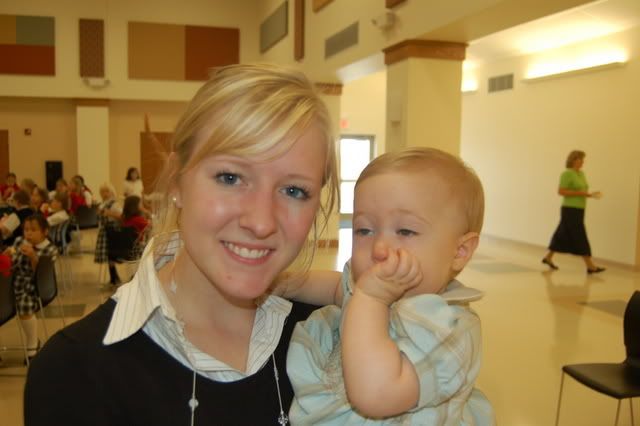
Maria~Angelica and our favorite senior, Ashlee, (the dd of Nicholas’ 1st grade teacher and a big M~A fan! Hi Ashley, thank you for all your help!)
Nicholas and Dean.
Basil ,and his 3rd grade classmates.
Maria~Angelica, Basil, Nicholas and Jonah.
-
~Some recent pictures~

Jonah and my goddaughter Angelika. Whenever I am out with the two of them people think they are twins. They are in kindergarten together. After school one day I took them out for “brunch”. They were very cute. Jonah was concerned why we were eating breakfast food at lunchtime though! LOL!
The boys surprised Yiayia with a Cookie Bouquet for her birthday.
The Cookie Bouquet- It says, “Smile it’s your Birthday!”
Earlier in the day my mom enjoyed her surprised, when flowers from Fr. and I were delivered to her door.
